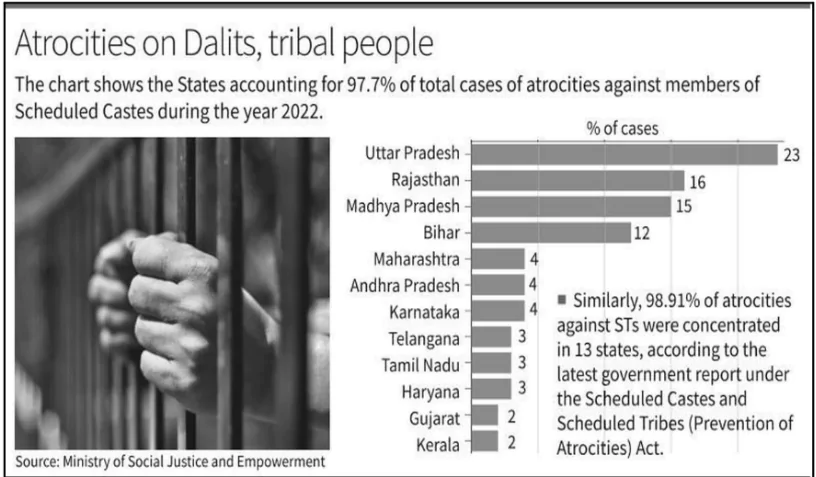Recent reports have highlighted cases of atrocities against SCs and STs.
Key Findings on Atrocities Against SCs and STs (2022)

- 97.7% of atrocities against SCs were reported from 13 states, with Uttar Pradesh, Rajasthan, and Madhya Pradesh leading in the number of cases.
- Uttar Pradesh: Reported the highest number of atrocities against SCs, with 12,287 cases (23.78%).
- Rajasthan and Odisha: Both states featured significantly in both SC and ST-related crimes.
- 98.91% of atrocities against STs were also concentrated in 13 states, with Madhya Pradesh and Rajasthan reporting the highest cases.
- Madhya Pradesh: Led in ST cases, with 2,979 cases (30.61%)
- Conviction rates under the Act have declined, dropping to 32.4% in 2022 from 39.2% in 2020.
- Many states still lack the necessary special courts to handle these cases efficiently.
Enroll now for UPSC Online Classes
Who are Dalit?
- Dalits, also known as Scheduled Castes (SCs), are a socially disadvantaged group in India.
- Historically, they were considered “untouchable” and faced severe discrimination and exclusion from mainstream society
Constitutional provisions to protect Rights of Dalits/SC
- Article 15(1): Prohibits discrimination on grounds of religion, race, caste, sex, or place of birth.
- Article 17: Abolishes untouchability.
- Article 23: Prohibits forced labour or begar.
- Article 46: Directs the state to promote the welfare of SCs and STs.
- Articles 16(4) & 16(5): Provide for reservations in services and posts for SCs and STs.
- Article 21: Guarantees the right to life and liberty, which includes the right to be free from discrimination.
- Article 335: Directs the state to ensure adequate representation of SCs and STs in services and posts under the state.
- Scheduled Cases and Scheduled Tribes (Prevention of Atrocities) Act
Scheduled Castes and Scheduled Tribes (Prevention of Atrocities) Act
- Enacted to prevent atrocities against SCs and STs, ensuring stronger legal recourse.
- Offences under this Act are tried in special courts for speedy trial.
- Focuses on providing protection and justice to vulnerable communities facing caste-based violence and abuse.
Recent Amendments:
- 2015 Amendment: This amendment introduced provisions for the protection of SC/ST women from sexual harassment.
- 2019 Amendment: This amendment was passed in response to the Supreme Court’s 2018 judgement that introduced certain procedural safeguards for arrests under the SC/ST Act.
- The 2019 amendment restored the original provisions of the Act, overriding the Supreme Court’s decision
|
Persisting Challenges in Implementation
- Declining conviction rates and delayed investigations pose major hurdles in securing justice.
- Inadequate special courts: Out of 498 districts across 14 states, only 194 have set up special courts.
- Some states, like Uttar Pradesh, report no atrocity-prone areas despite high numbers of cases.
- SC/ST protection cells exist, but their efficacy remains uneven across states.
Check Out UPSC NCERT Textbooks From PW Store
Way Forward
- Strengthen special courts: Ensure the establishment of more special courts for faster trials.
- Improve conviction rates: Focus on improving investigation processes and addressing legal gaps.
- Identify atrocity-prone areas: States should recognize and address high-risk regions for targeted interventions.
- Awareness and sensitization: Conduct awareness campaigns to prevent atrocities and ensure better enforcement of the SC/ST Act.
![]() 23 Sep 2024
23 Sep 2024
